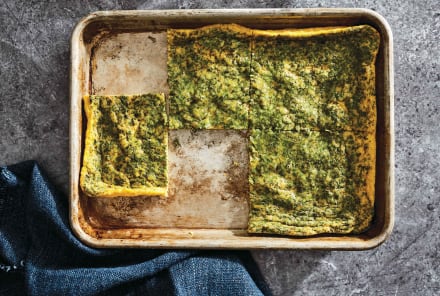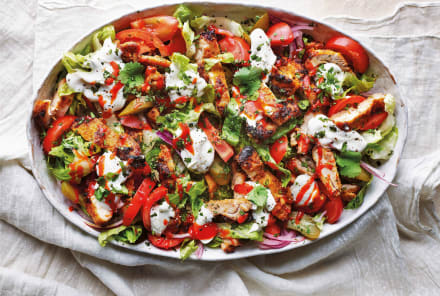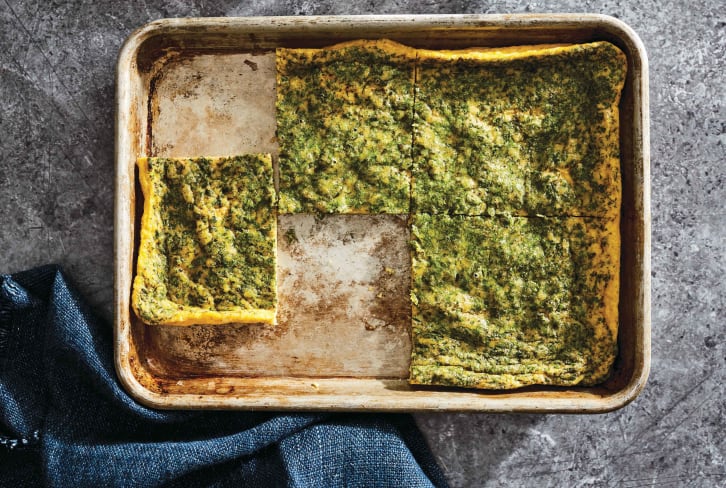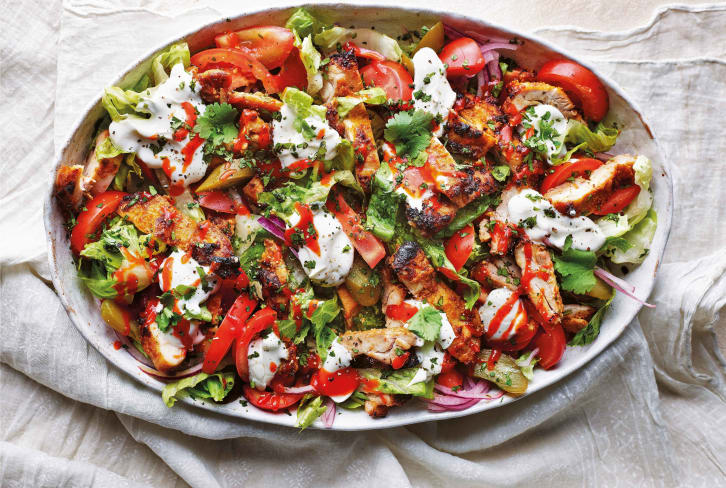Advertisement
Carb Cycling 101: The Benefits, Drawbacks & Who Should Avoid It


Often advertised as an "easier alternative" to low-carb dieting, carb cycling is a (still very restrictive) eating pattern that switches between high-carb and low-carb days throughout the week. But does it really live up to its promises of promoting fat loss and managing blood sugar?
We dug into the existing research on carb cycling to make a judgment call on whether it's actually worth trying, how to do it healthily, and who should avoid it and opt for a more flexible approach instead.
Top insights at a glance
- Carb cycling started as a tool to help bodybuilders gear up for competition, but it's become more popular as low-carb diets like the keto diet have taken off.
- Proponents of carb cycling anecdotally claim it can help with fat loss, blood sugar management, and athletic performance, but the research supporting it is limited.
- Carb cycling is very restrictive, and it won't work for everybody. There are more flexible ways to achieve healthy weight loss that we'd recommend first.
What is carb cycling?
Carb cycling is an eating pattern that involves cycling between low-carb and high-carb days. It's rooted in the competitive weightlifting world. Bodybuilders have long used it as a way to deplete glycogen stores, lose water weight, and optimize exercise performance right before an event.
Over the past few years, as low-carb eating patterns like the ketogenic diet have soared in popularity, carb cycling has become more mainstream.
"Carb cycling is a tool often used for people following a lower-carb diet eating plan like a ketogenic diet that involves alternating the amount of carbohydrates that you consume on different days," explains Will Cole, IFMCP, DNM, D.C., a functional medicine practitioner.
According to Cole, a typical seven-day carb cycling plan might involve cutting your carb consumption for five or six days and then increasing your intake one or two days per week. For athletes, high-carb days often align with their training plan to provide extra fuel for high-intensity or endurance workouts.
Proponents of carb cycling claim that it can promote weight loss, boost energy levels, and even enhance insulin sensitivity. Plus, some note that it can be a more manageable approach to low-carb eating plans by allowing you to enjoy your favorite high-carb foods a few times per week.
On the other hand, some note that carb cycling can still be overly restrictive and might not be a good fit for everyone.
Summary
What are the reasons to try it?
Here are a few reasons someone might be curious about carb cycling, according to the experts:
You're following keto but have hit a plateau.
"Carb cycling is not the first option that I recommend if you are just starting out on a ketogenic diet, but it can be a great approach for some people who've reached a plateau in their health," Cole tells mindbodygreen.
This approach, sometimes called "keto cycling," involves following a high-fat, low-carb diet, but taking a day or two off each week to cycle in and out of ketosis, a metabolic state in which your body burns fat for fuel instead of sugar1.
Keto cycling is a relatively new concept, meaning there's not a lot of research on whether or not it's actually effective. However, proponents claim that it can make it easier to stick to a keto diet, which could translate to greater weight loss and health benefits long term.
If you've been trying keto for a while but have hit a plateau, consider taking a closer look at your diet and recalculating your macronutrient requirements to adjust as needed. Some people may also find that following a more relaxed approach (such as the lazy keto diet) or even simply cutting back on carbs2 can be more sustainable ways to lose weight and keep blood sugar levels steady.
You're an athlete looking to maximize your performance
Carb cycling is often used to help enhance endurance and athletic performance, according to Amy Shapiro, M.S., R.D., CDN, a registered dietitian and founder of Real Nutrition NYC.
She explains that high-carb days can increase stored carbohydrates (aka glycogen)3, which serves as the body's main energy source. On low-carb days, the focus is shifted to proteins and healthy fats to help support recovery.
One review published in Sports Medicine found that increasing carb intake before a cycling time trial could boost power output and speed3 in athletes by increasing the oxidation (or breakdown) of carbohydrates. Some studies also suggest that eating extra carbs around your workouts could replenish glycogen stores, speed up recovery4, and improve performance during endurance exercise.
You're interested in eating for your menstrual cycle.
According to Cole, carb cycling might be especially beneficial for women. He explains that your body requires more carbs during certain parts of your cycle and recommends increasing your intake of fiber-rich carbs around menstruation and ovulation.
Although research in this area is still pretty limited, science does show that dietary intake definitely does fluctuate5 throughout the menstrual cycle. This might be due to changes in hormone levels like estrogen and progesterone, which can affect appetite, coupled with variations in the breakdown of carbs, fat, and protein at different points in your cycle.
Your body might also have a higher tolerance for carbs6 during the first half of your cycle, meaning that the period from menstruation to ovulation is the best time to consume carbs.
Of course, everyone is different, and your carb cravings might peak at different points in your cycle, so your mileage may vary here. If carb cycling isn't for you, simply listening to your body and following a balanced diet throughout your cycle can be a good tried-and-true alternative.
You're looking to lose fat or gain muscle.
"Carb cycling is usually used for athletes or bodybuilders who want to change their body composition," says Shapiro, noting that it can be used to reduce body fat and increase muscle mass.
According to one study, intermittently restricting carbs and calories could lead to greater fat loss and insulin sensitivity compared to cutting calories consistently7. Meanwhile, another two-week study showed that reducing carb intake on alternate days was as effective at reducing body weight and belly fat8 as following a low-calorie diet two days per week.
That being said, if weight loss is your goal, carb cycling should also be paired with a calorie deficit, meaning that you're consuming fewer calories than you burn each day.
Sample schedule
With carb cycling, your protein intake should remain steady (here's how to calculate your ideal protein intake), while your fat intake might fluctuate depending on your daily carb goals.
You should adjust your daily carb goals to fit your daily calorie needs. Shapiro recommends using an online calculator to determine your unique target calorie intake and then subtracting the amount of protein and fat that you need to determine your carb requirements for high-carb days.
"From there, your moderate-carb days are 15-20% less than that number, and your low-carb days are 20-25% less than your moderate-carb day number," she explains.
Low-carb diets typically contain less than 130 grams of carbs2, or less than 26% of total calories from carbs per day.
Here's what a typical week might look like on a carb-cycling routine:
| Day | Type | Carb amount | Workout |
|---|---|---|---|
| Monday | Very low carb | 50 grams | Rest day |
| Tuesday | High carb | 200 grams | High-intensity exercise |
| Wednesday | Moderate | 150 grams | Zone 2 exercise |
| Thursday | Low carb | 100 grams | Rest day or light activity |
| Friday | High carb | 200 grams | High-intensity exercise |
| Saturday | Moderate carb | 150 grams | Zone 2 exercise |
| Sunday | Low carb | 100 grams | Rest day or light activity |
Tips for carb cycling
If you're going to try carb cycling, here are a few tips to help you get going safely:
Stick to high-quality carbs.
Although carb cycling is all about sticking to a specific amount of carbs each day, Cole emphasizes that not all carbs are created equal.
Opting for healthy high-carb foods like vegetables, potatoes, brown rice, and beans can help squeeze more carbs into your diet while also bumping up your intake of other important nutrients like fiber, vitamins, and minerals.
"Refined sugar and other processed carbs come with their own list of downsides for your health that can ultimately negate the benefits you are trying to achieve from carb cycling in the first place," says Cole.
Focus on the bigger picture.
Even though carbohydrates may be the main focus of carb cycling, maintaining a healthy overall diet is just as important. For example, fitting enough protein into your daily diet can strengthen immune function9, boost muscle building10, and promote weight management11.
Meanwhile, rounding out your meal plan with healthy fats like omega-3 fatty acids can ease inflammation12, support brain function, and help keep your heart healthy.
If you're looking to lose weight, maintaining a calorie deficit is also key to help you reach your goals, regardless of your carb consumption.
Don't be afraid to experiment.
"There are a variety of ways to do carb cycling, from daily carb consumption changes to weekly carb refeeding schedules," Shapiro tells mindbodygreen. "The most important part is to see which cycle works best for you, as carb cycling takes a lot of time and commitment."
Shapiro recommends committing to a carb cycling schedule and training plan for at least one full cycle to decide whether it's a good fit. If it's too difficult to maintain or it's just not working out, switch up your schedule and try again to find what works for you.
Loosen up the rules as needed.
If following a full-fledged carb cycling plan isn't for you, but you want to maximize your fitness, try eating a light meal or snack before hitting the gym instead. Pairing protein with a good source of carbs before working out has been shown to increase glycogen stores13, reduce muscle damage, and help you make the most of longer workouts.
Consult with a professional.
If you're having trouble getting into the swing of things or are unsure whether you're really meeting your nutritional needs, Shapiro recommends reaching out to a registered dietitian or health coach. Not only can they provide individualized guidance and feedback to help you reach your goals, but they can also ensure you're hitting your carb goals in the healthiest way possible, according to Shapiro.
On the flip side: Objections to carb cycling
One of the biggest criticisms of carb cycling is that it isn't enough science to support its efficacy. For example, according to one review of 49 studies13 published in Nutrients in 2022, while some studies found that increasing carb intake could help improve performance after depleting glycogen stores, other studies found no benefits of carb cycling.
Critics of carb cycling also point out that carbs serve as the body's primary source of energy, meaning that decreasing your intake on a regular basis might leave you feeling sluggish and drained—the exact opposite of what you want.
Without proper planning, carb cycling can also make it more difficult to meet your nutritional needs, which may ultimately negate any potential benefits.
Additionally, from a dietitian's perspective, carb cycling can be quite challenging to sustain in the long run, notes Shapiro. Meticulously tracking your macronutrient intake daily can be pretty taxing, and it may even negatively impact mental health in some people. "[Carb cycling] might lead to obsessive thoughts about food, which can lead to future eating disorders," cautions Shapiro.
Summary
The mindbodygreen POV
At the end of the day, scientific literature on carb cycling is pretty limited. And while there is some research to support carb cycling in some cases—including for promoting weight loss or athletic performance—a lot of studies have turned up conflicting results, and it's unclear whether or not it's any more effective than other eating patterns.
For this reason, we don't endorse carb cycling as a weight loss or athletic performance tool. Many factors can influence how people (particularly women5) process carbohydrates, and it's important to take this bio-individuality into account when making food choices.
Carb cycling is also far from the only way to lose fat or build muscle mass. Reducing your calorie intake, staying active, and reducing your portion sizes are a few more flexible strategies that can help you lose weight14, with no carb counting required. Similarly, ramping up your protein intake can effectively increase muscle growth15 when combined with resistance training.
That being said, if you like a challenge or want to use carb cycling as a way to make the keto diet more approachable, by all means, try it. Just be sure to prioritize nutrient-dense carbs and continue to eat enough protein and healthy fat while you do. And if you do find carb cycling too difficult to maintain, no shame: Switch up your schedule and try again to find what works for you.
Summary
This doesn't apply to you if:
While carb cycling can be a good fit for some people, it's definitely not recommended for everyone. In particular, Cole points out that carb cycling might not be a good idea for people with underlying health conditions like insulin resistance or diabetes. People who are pregnant and those who have a history of disordered eating will also want to steer clear of carb cycling.
Side effects
Cutting your carb consumption may cause some negative side effects16, including fatigue, hunger, constipation, and bloating.
These symptoms, sometimes known as the "carb flu" or "keto flu" are common any time you start a low-carb diet but typically clear up quickly as your body adapts. However, this might take a little longer with carb cycling, as you're alternating between high-carb and low-carb days without giving your body time to adjust.
FAQ
Is carb cycling good for women?
Carb cycling may be beneficial throughout the menstrual cycle, as some women may require higher amounts of carbs during menstruation and ovulation, but everyone's different.
What is a good carb cycling schedule?
If you're just starting out with carb cycling, try following a low- or moderate-carb diet for five days each week and increasing your carb intake once or twice weekly. Plan for your most intense sweat sessions to land on high-carb days, and take it easy on low-carb days.
Can carb cycling work?
Carb cycling may be beneficial if you're trying to lose weight and have hit a plateau or if you're interested in maximizing your performance at the gym by aligning your workouts with your carb intake. However, it's a very restrictive regimen that doesn't have much science behind it. There are more flexible ways to lose fat and gain muscle based on your unique dietary needs.
The takeaway
Carb cycling can help you line your diet up with your workout plan, which might offer benefits for exercise performance and muscle growth, but the science on it is very limited, and the jury's still out on whether it's actually more effective than other less restrictive plans. Plus, carbs are just one piece of the puzzle when it comes to increasing your fitness and maintaining a healthy weight. Here are some of the best foods to eat before heading to the gym based on your goals.
16 Sources
- https://www.ncbi.nlm.nih.gov/books/NBK499830/
- https://www.ncbi.nlm.nih.gov/books/NBK537084/
- https://pubmed.ncbi.nlm.nih.gov/23657935/
- https://www.ncbi.nlm.nih.gov/pmc/articles/PMC6566225/
- https://www.ncbi.nlm.nih.gov/pmc/articles/PMC10251302/
- https://www.ncbi.nlm.nih.gov/pmc/articles/PMC4190921/
- https://www.ncbi.nlm.nih.gov/pmc/articles/PMC5857384/
- https://pubmed.ncbi.nlm.nih.gov/37545298/
- https://pubmed.ncbi.nlm.nih.gov/32471251/
- https://pubmed.ncbi.nlm.nih.gov/26197807/
- https://pubmed.ncbi.nlm.nih.gov/32699189/
- https://www.ncbi.nlm.nih.gov/books/NBK564314/
- https://www.ncbi.nlm.nih.gov/pmc/articles/PMC8878406/
- https://www.ncbi.nlm.nih.gov/pmc/articles/PMC6163457/
- https://pubmed.ncbi.nlm.nih.gov/34822138/
- https://www.ncbi.nlm.nih.gov/pmc/articles/PMC7082414/
Watch Next
Enjoy some of our favorite clips from classes
Enjoy some of our favorite clips from classes
What Is Meditation?
Mindfulness/Spirituality | Light Watkins
Box Breathing
Mindfulness/Spirituality | Gwen Dittmar
What Breathwork Can Address
Mindfulness/Spirituality | Gwen Dittmar
The 8 Limbs of Yoga - What is Asana?
Yoga | Caley Alyssa
Two Standing Postures to Open Up Tight Hips
Yoga | Caley Alyssa
How Plants Can Optimize Athletic Performance
Nutrition | Rich Roll
What to Eat Before a Workout
Nutrition | Rich Roll
How Ayurveda Helps Us Navigate Modern Life
Nutrition | Sahara Rose
Messages About Love & Relationships
Love & Relationships | Esther Perel
Love Languages
Love & Relationships | Esther Perel
What Is Meditation?
Box Breathing
What Breathwork Can Address
The 8 Limbs of Yoga - What is Asana?
Two Standing Postures to Open Up Tight Hips
How Plants Can Optimize Athletic Performance
What to Eat Before a Workout
How Ayurveda Helps Us Navigate Modern Life
Messages About Love & Relationships
Love Languages
Advertisement

How To Use Food To Recover From Autoimmunity: An MD's Top 4 Tips
Sara Szal Gottfried, M.D.










